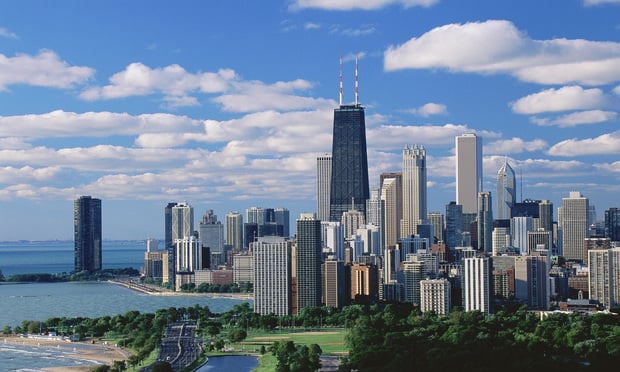CHICAGO—The US high-tech industry has played an outsized role in the recovery of the job market, and Midwestern cities such as Chicago, Minneapolis and Indianapolis have made strides toward creating clusters of tech entrepreneurs that may eventually have a major impact on their respective real estate markets, according to Jones Lang LaSalle's recently published US High-technology Office Outlook, 2013.
“The growth has occurred so quickly that high-tech companies in many of the country's core markets now face a dwindling supply of creative office space,” the report noted. “While Silicon Valley maintains the lion's share of high-tech companies, innovation centers are springing up in numerous other locations, driving demand for new employees and commercial real estate in the process.”
Metropolitan areas that help foster high-tech manufacturing and services could reap a jobs bonanza. US high-tech employment in the manufacturing and services sectors combined grew 1.5 times faster than total US employment growth in the 12 months leading up to May 2013, JLL researchers found. And job growth in high-tech services outperformed total nonfarm employment growth by an average of four to one since January 2010.
And although perennial tech heavyweights like San Francisco, Silicon Valley, Seattle and Boston still have the most momentum among US metropolitan areas, Chicago, Minneapolis and Indianapolis have also become emerging markets.
Minneapolis earned its status as an emerging tech market largely due to the many Fortune 500 companies, such as 3M, that call it home. In addition, the highly-educated city, where 38.5% of the population over 25 has at least a bachelor's degree, one of the highest rates in the country, has a deep pool of IT workers. “All that provides a little bit of a hotbed,” says Bobby Goodman, a vice president at JLL.
Tagging Indianapolis as an emerging tech hub may surprise some people. “They definitely do have some challenges,” Goodman says, especially since “it's a secondary or perhaps a tertiary market.” However, the proximity to renowned engineering schools like Indiana University and Purdue University has provided a boost.
According to Diana Nyirenda, an Indianapolis-based senior research analyst for JLL, both schools “have constructed new technology buildings and they are investing in attracting students interested in the STEM fields.”
And Chicago, due to the establishment of incubator spaces for new high-tech ventures, a subject of particular interest to JLL researchers, has benefitted from the growth in start-up companies.
Incubator spaces like 1871 and Catapult Chicago bring start-ups together under a single roof, provide more affordable space, and perhaps include low-cost business services like accounting from other partners in the effort. “It also fosters a lot of idea sharing across the companies,” says Goodman. These shared spaces may be the key to building a high-tech sector, he adds, since “it's a lot harder to start in high-tech.” Unlike other types of businesses, many digital firms at their outset “really don't have any revenue to show yet,” and need that initial protection the incubator provides.
Many of the ideas shared by these entrepreneurs concern how to raise venture capital. “1871, the city's most well-known tech incubator,” says Robert Kramp, a vice president of JLL, “opened in May 2012, and since then has housed 225 start-up companies. The start-ups have created 800 jobs, generated $12.7 million in revenue and raised $27.6 million in venture capital.”
“Chicago has hit the map,” adds Goodman. He knows of a firm that runs an influential co-working space for San Francisco high-tech companies that wants to set up shop in Chicago. “What they see is a good amount of growth and money coming into Chicago.” The establishment of 1871 made perhaps the biggest impression. “That's the one group that they've heard of; it's a big, nationally-recognized flag. People around the country have started taking us seriously.”
Still, Chicago lags behind other major tech markets. Seattle-area companies, for example, attracted $59.5 million in venture capital funding during the first quarter of 2013, JLL researchers found, while Chicagoans garnered $10.8 million. Salt Lake City firms received $85.1 million in the same period, and those in San Francisco got $735.7 million. But Goodman remains optimistic about Chicago's potential. “We're growing and we're starting to take a bigger piece of the pie.”
And the city's incubators and co-working spaces should protect landlords from a repeat of the giant flash in the pan that was the Internet boom of the 1990's. High-tech start-ups proliferated across the city, signing leases and then vanishing when their expected riches did not materialize. “I think a lot of people learned from their mistakes back then,” says Goodman. Business plans, including calculations on real estate costs, have gotten much more realistic. The incubators provide more guidance and companies don't strike out on their own until the money starts rolling in. “Today, nobody says 'let's just take 20,000-square-feet and hope we make it.'”
But for this present-day boom to truly transform the city's real estate market, “we need these firms to stay based in Chicago.” He gives credit to Mayor Emanuel for welcoming the rising industry, and hopes the city can keep all those corporate headquarters here with tools like tax abatements. “All of the companies that pass that early stage will be a target for a takeover, and it's really important that they maintain their autonomy instead of shipping all of their decisions and many jobs out to Austin or San Francisco.”
Want to continue reading?
Become a Free ALM Digital Reader.
Once you are an ALM Digital Member, you’ll receive:
- Breaking commercial real estate news and analysis, on-site and via our newsletters and custom alerts
- Educational webcasts, white papers, and ebooks from industry thought leaders
- Critical coverage of the property casualty insurance and financial advisory markets on our other ALM sites, PropertyCasualty360 and ThinkAdvisor
Already have an account? Sign In Now
*May exclude premium content© 2025 ALM Global, LLC, All Rights Reserved. Request academic re-use from www.copyright.com. All other uses, submit a request to [email protected]. For more information visit Asset & Logo Licensing.








